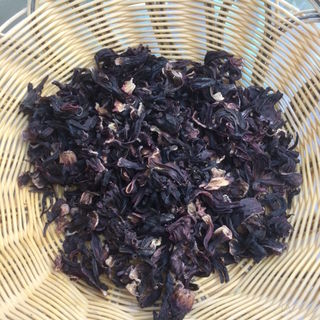SSRIs
Jamaica (Roselle): A Tea to Lift your Spirits
An inexpensive, delicious natural anti-depressant drink
Posted November 5, 2016
Jamaica, (Roselle) is a medicinal hibiscus flower and member of the Malvaceae family. It is believed to have been introduced to the Jamaica in the 1700's by African slaves - hence the name.

Jamaica, (pronounced Ha-my-ka in Spanish) makes a delicious bright red drink that is a very accessible and inexpensive source of vitamin C, calcium, and powerful antioxidants. It is most often found in Mexican and Central American markets in the US. The calyces of the Jamaica plant are used traditionally as a refreshing beverage called flor de Jamaica. It is also used traditionally in Mexico as a medicine to reduce fever and during colds and to provide nourishment during illness.
Jamaica has high levels of anthocyanins, powerful antioxidants that scavenge inflammatory cells in the body. Anthocyanins are what produce the rich red, blue, and purplish colors of berries and fruits. These benefits accrue not only to pain and to improved arterial function for heart health, but also depression, since inflammation underlies depression. Jamaica also lowers cholesterol and blood glucose, has hypotensive (lowers blood pressure) antibacterial activity and is protective of kidneys and the liver.
To gain medicinal benefits: Use 1-2 glasses of Jamaica daily. Because of its affordability, Jamaica can be served in agencies and institutions providing care for substance use recovery as well as shelters serving the homeless who rarely have access to these nourishing foods.
To Prepare: Boil 1 quart of water and add a heaping handful of calyces. Gently simmer for 10 minutes until richly red. Strain and add a little raw honey or stevia to taste. Jamaica makes a wonderful drink, hot or cold. Do not add sugar since sugar is a powerful inflammatory food that counteracts the effects of the natural antioxidants.
Tsai, P.J. McIntosh, J., Pearce, P., Camden, B., Jordan, R.,(2002) Anthocyanin and antioxidant capacity in Roselle (Hibiscus Sabdariffa L.) extract, Food Research International, 35, (4) 351-356.
Wahabi, H.A., Alansary, L.A., Al-Sabban, A.H., Glasziuo, P. (2010). The effectiveness of Hibiscus sabdariffa in the treatment of hypertension: A systematic review. Phytomedicine. 17 (2): 83


